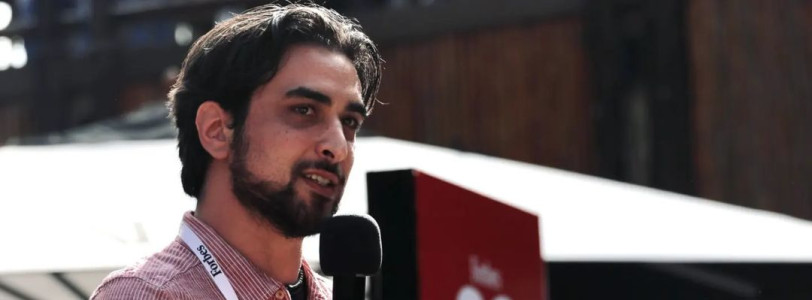Could you please introduce yourself to the reader?
I’m Matteo Bergamini and I am the CEO and Founder of ShoutOut UK. I set up the organisation when I was 22, back in 2015. Our main focus is getting young people involved in the political process by running political and media literacy programmes across the UK. We deliver workshops about how our democracy functions and how to critically analyse the information we receive. We also do a lot around countering misinformation and disinformation narratives.
We also run creative democratic engagement campaigns, mainly with the Greater London Authority, which is an impartial non-electoral specific campaign. It involves a huge coalition of civil society campaigners. The aim is to create a week every year where people check their democratic health. On top of that, through career professional development work we’re trying to boost the ability of teachers to deliver political and media literacy content. We’re aiming to allow for as much flexibility as possible given the packed schedule of most teachers.
What role does misinformation and a lack of media literacy play in preventing young people’s participation in politics?
They both play profound roles. You can’t make an informed decision if you don’t know what factual information is, or what it looks like. Also, you cannot participate fully if you are polarised and end up defaulting to your biases. When we don’t have a critical grasp of reality we often rely on our base instinct and our biases.
There’s nothing necessarily wrong with our biases but critical thinking allows us to think critically about the information we receive. When you heavily rely on your biases, you end up basing your critical approach on whether or not you want something to be true. Media literacy attempts to cut through that and build a culture within yourself where you level that critical thinking at everything and not just things you want to be untrue.
False information has always been around. What’s new is the speed at which it is disseminated. Similarly, the cost of creating false content is much much lower than it used to be. Propaganda in the traditional sense aimed to create a counter-narrative, to make you not believe in A but believe in B. Disinformation campaigns often don’t try and make you believe in B. Instead, they’ll create B, C, D, E and F to create utter chaos in information so that you end up believing in nothing and questioning everything. Questioning everything can be good in some ways, but not in ways that promote nihilism.
In the last few years, how has your work shifted in responding to AI?
Our work has shifted a lot more to countering disinformation. We are quite unique because we see AI as an important tool, not necessarily bad. Bad actors are going to keep going and use these types of tools. These technologies are here to stay, whether we like it or not. Technology is a tool to be used, which can be used in positive or negative ways. We’re going to be using it to enhance our courses and be more reactionary to things that happen in real time. At the same time, people need to know that there is going to be more and more AI generated content. Similarly, if we thought the spread of false content was fast before, we now have models that can generate content 24/7.
On top of that, I think it really puts into question the way we deal with media literacy. From the funder side, there was always a lot of focus on fact checking. However the reality is that fact checkers often preach to the converted. Fact checkers can’t keep up with false information already and there is a danger they will fall even more behind with AI. The focus now more than ever should be on prevention. That’s where education comes in. We’re giving people the tools to be their own gatekeepers.
Before social media, gatekeepers were predominantly the government and mainstream media. Now, those two have essentially lost control. We (the citizens) are now the gatekeepers. The introduction of fact checkers aimed to create other gatekeepers but it fundamentally doesn't work. They provide a good service but the reality is we need a whole society approach. This is where education comes in. We need to give people the tools to understand what good journalism looks like.
What are the major parties doing on media and political literacy? Are they doing enough and what more could they be doing?
I can’t really comment on party politics. We are the secretariat for the All Party Parliamentary Group on Political LIteracy. We have cross-party consensus from both the Conservative and Labour Party who acknowledge that this is a problem that needs attention. Both parties have been more responsive since the COVID-19 pandemic. The Prevent programme makes sense when it comes to countering disinformation. There is a real appetite within those bodies and the Home Office as well as the local councils that we work with to heal this problem.
There can always be more. This is one of the biggest problems of our generation. There are a lot of problems we’re facing, but we can’t deal with problems like the climate crisis without figuring out how to counter disinformation. I think this will be the defining issue of our generation.
Do you think all young people are likely to vote alike in the next general election, or is it more complicated?
Young people definitely don’t vote in a homogenous bloc, but there are trends. Issues around climate change and identity are key. The cost-of-living crisis and cost of rent will also play a key role. I think it is misguided when we think of young people as being obsessive over certain policies in the same way not all elderly individuals are obsessed with pensions. Every age group has a variety of interests. Like with any age group, I would argue that misinformation and disinformation will affect young people most. We often think that tech savvy attitudes help people become more media literate, but that’s not always the case
Tell us about your work at London Registration Week. How did you see the event impact how people came to view political participation?
Whenever an election is looming, there is a scramble to do one-off voter registration drives. That is plugging a hole - it’s not consistent, and that’s a problem. When the Greater London Authority (GLA) launched the London Registration Week in 2019, they made sure it was impartial which is really important. The term ‘impartial’ is thrown around and it shouldn’t be. Impartial information is a superpower if it’s done right. They also made sure it was yearly, creating consistency which is key. Furthermore, the GLA thought the week shouldn’t be election-specific. Instead, they focussed on questions like, are you registered to vote? Do you know the most up-to-date information?
In a recent report, the Electoral Commission highlighted shifts in voter registration numbers. They said the most notable change was in London boroughs, with 76% in 2018 to 82% in 2022. So sustained year-on-year engagement is the way to go if you want to increase democratic engagement. Long-term work is required to increase the health of our democracy.
What is your encouragement to young people that youth voice matters?
Everyone’s voice matters if you make it matter. We have a perception that our voice doesn’t matter because *insert whatever issue you have*. The problem is that it becomes a self-fulfilling prophecy. This may sound blunt, but no one owes you anything. If you don’t make it matter, other people won’t make it matter. The only choice we have when it comes to politics is whether or not we want to be in the conversation. Or we let other people who may or may not have your best interests have a say in your life.
The Young Vote
Voice is on a mission to understand what you want from the next government, what issues are important to you at the next election and whether or not you're likely to vote. Whether you care about politics, or don't care at all, we want to hear from you.
To share your thoughts, participate in The Young Vote Survey. If you need extra incentive, it'll take under 10 minutes and you can win one of two £40 vouchers.









0 Comments